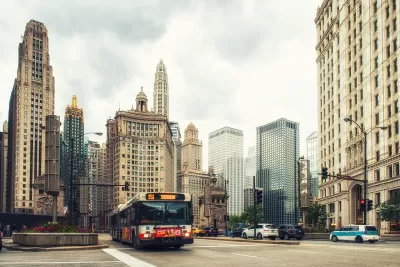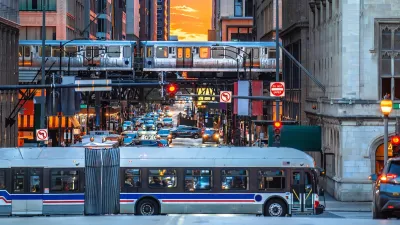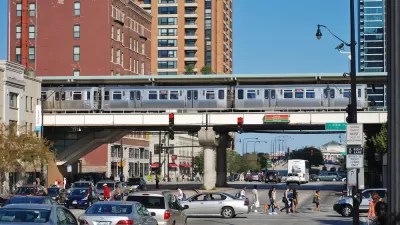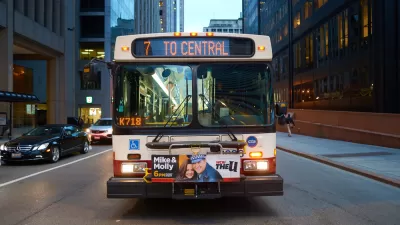Researchers found that 99 percent of rideshare trips could be made by buses and trains — but the time savings roughly equal an hour’s wage.

Almost all trips completed using rideshare services in Chicago could be made by public transit, a new analysis shows — but riders save the equivalent of roughly an hour’s wage by choosing the more convenient rideshare services, signaling a need for more accessible and reliable transit.
As Jonathan Andrews explains in Cities Today, “The research team calculated how the cost and duration of each TNC trip compared with using transit to make the same journey. From that, the researchers could put a price on the time riders saved choosing Lyft or Uber over transit – US$34 per hour and nearly identical to the region’s median hourly wage.”
The researchers also evaluated “broader societal costs” such as air pollution and traffic, finding that “While congestion pricing and electrifying rideshare fleets can help mitigate environmental harm, the study suggests the biggest impact could come from making transit more efficient and convenient.”
The study concludes that reducing the time people wait for buses and trains and putting stations closer to people’s homes could go a long way toward increasing ridership. During the study period, Chicago’s transit vehicles were operating at just 20 percent of their capacity.
FULL STORY: Most Uber and Lyft trips replaceable by public transit, says study

Manufactured Crisis: Losing the Nation’s Largest Source of Unsubsidized Affordable Housing
Manufactured housing communities have long been an affordable housing option for millions of people living in the U.S., but that affordability is disappearing rapidly. How did we get here?

Americans May Be Stuck — But Why?
Americans are moving a lot less than they once did, and that is a problem. While Yoni Applebaum, in his highly-publicized article Stuck, gets the reasons badly wrong, it's still important to ask: why are we moving so much less than before?

Research Shows More Roads = More Driving
A national study shows, once again, that increasing road supply induces additional vehicle travel, particularly over the long run.

Judge Halts Enforcement of Anti-Homeless Laws in Grants Pass
The Oregon city will be barred from enforcing two ordinances that prosecute unhoused residents until it increases capacity and accessibility at designated camping sites.

Advancing Sustainability in Los Angeles County Schools
The Los Angeles County Office of Education’s Green Schools Symposium brings together educators, students, and experts to advance sustainability in schools through innovative design, climate resilience strategies, and collaborative learning.

Using Old Oil and Gas Wells for Green Energy Storage
Penn State researchers have found that repurposing abandoned oil and gas wells for geothermal-assisted compressed-air energy storage can boost efficiency, reduce environmental risks, and support clean energy and job transitions.
Urban Design for Planners 1: Software Tools
This six-course series explores essential urban design concepts using open source software and equips planners with the tools they need to participate fully in the urban design process.
Planning for Universal Design
Learn the tools for implementing Universal Design in planning regulations.
City of Moreno Valley
Institute for Housing and Urban Development Studies (IHS)
City of Grandview
Harvard GSD Executive Education
NYU Wagner Graduate School of Public Service
City of Cambridge, Maryland
Newport County Development Council: Connect Greater Newport





























